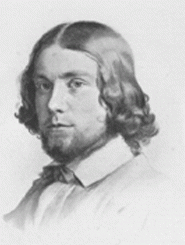James Russell Lowell (1819-1891) is one of the group of authors sometimes called the Fireside Poets or the Schoolroom Poets, a group which also included Henry Wadsworth Longfellow, John Greenleaf Whittier, and Oliver Wendell Holmes. Because of their conservative approach to verse and the often blatant morality in their poetry, the very qualities that made them popular in their day, they have been out of favor throughout much of the twentieth century. Nevertheless members of the group like Lowell and Whittier, both ardent abolitionists, may not have seemed so conservative in the nineteenth century.
Lowell's contribution to Arthurian literature is his poem "The Vision of Sir Launfal." First published in 1848, "The Vision of Sir Launfal" tells the story of Launfal, who is initially a haughty nobleman. The night before he is to begin a quest for the Holy Grail he has a dream vision in which he sets out on the quest. His first act is to toss a gold piece scornfully to a beggar. When he returns in the winter he has been chastened by his own suffering on the quest and shares his crust of bread with the beggar in a true spirit of charity and brings him a drink from a stream in a wooden cup. The beggar is transformed into Christ and the bread and wine into his body and blood. The wooden cup is the Grail that Launfal has sought. Having learned his lesson, he opens his hall and shares his bounty with anyone who wishes it.
Lowell's poem is particularly interesting as a democratization of the Grail story. Important in this regard is the "Author's Note" prefatory to the poem. In this note, Lowell says that he opens the Grail quest to others besides Arthur's knights and places it in a time other
...
Read
More
James Russell Lowell (1819-1891) is one of the group of authors sometimes called the Fireside Poets or the Schoolroom Poets, a group which also included Henry Wadsworth Longfellow, John Greenleaf Whittier, and Oliver Wendell Holmes. Because of their conservative approach to verse and the often blatant morality in their poetry, the very qualities that made them popular in their day, they have been out of favor throughout much of the twentieth century. Nevertheless members of the group like Lowell and Whittier, both ardent abolitionists, may not have seemed so conservative in the nineteenth century.
Lowell's contribution to Arthurian literature is his poem "The Vision of Sir Launfal." First published in 1848, "The Vision of Sir Launfal" tells the story of Launfal, who is initially a haughty nobleman. The night before he is to begin a quest for the Holy Grail he has a dream vision in which he sets out on the quest. His first act is to toss a gold piece scornfully to a beggar. When he returns in the winter he has been chastened by his own suffering on the quest and shares his crust of bread with the beggar in a true spirit of charity and brings him a drink from a stream in a wooden cup. The beggar is transformed into Christ and the bread and wine into his body and blood. The wooden cup is the Grail that Launfal has sought. Having learned his lesson, he opens his hall and shares his bounty with anyone who wishes it.
Lowell's poem is particularly interesting as a democratization of the Grail story. Important in this regard is the "Author's Note" prefatory to the poem. In this note, Lowell says that he opens the Grail quest to others besides Arthur's knights and places it in a time other than that of Arthur's reign. This seems strange since Launfal is one of Arthur's knights in several medieval sources and since there is nothing in the poem that dates it to a time other than Arthur's reign. Thus Lowell deliberately creates a non-Arthurian Arthurian poem in order to suggest that his vision of the Grail as true charity is something that any person in any time can achieve.
"The Vision of Sir Launfal" achieved tremendous popularity. It was often used as a school text; and there was a new edition or a reprint of an earlier edition virtually every year from its first publication in 1848 until after the turn of the century. It is one of the key texts in the American Arthurian tradition.
Biography written by: Alan Lupack
bibliography
Howard, Leon. Victorian Knight-Errant: A Study of the Early Literary Career of James Russell Lowell. Berkeley: University of California Press, 1952.
Read
Less

 The Vision of Sir Launfal - 1848 (Author)
The Vision of Sir Launfal - 1848 (Author) 




